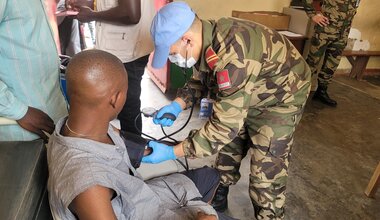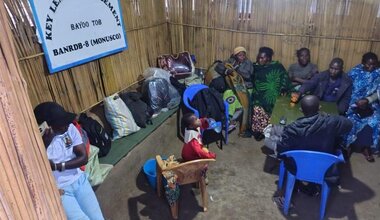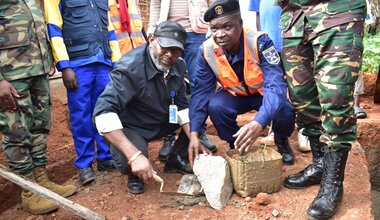Mr. Roger Meece Addresses Security Council
New York, 7 February 2011 - Mr. President, distinguished Members of the Council,
1. It is my honor to appear before you today in association with the second report presented by the Secretary-General since the adoption of Resolution 1925. I am pleased to note progress in several significant areas of MONUSCO's mandate, but also note continuing concerns and issues, particularly in regard to the situation in eastern DRC, as was reflected in the Secretary-General's report.
2. Les relations entre la MONUSCO et le Gouvernement congolais ont connu une amélioration constante, comme nous l'a confirmé le Président Kabila lors de sa rencontre avec Mme la Vice-Secrétaire générale et avec moi-même au mois de décembre. La Mission a ainsi pu établir un dialogue très constructif avec des interlocuteurs civils et militaires à tous les niveaux du Gouvernement. Il en a résulté, entre autres, un renforcement de la coopération pour ce qui est de la coordination opérationnelle au plan militaire, des programmes de formation de la police, de l'approche adoptée pour les programmes de stabilisation, et du processus d'évaluation conjointe.
3. The ongoing joint assessment process incorporates an active review of security conditions utilizing input from a variety of sources, including non-governmental organizations (NGO's) and the UN country team. Findings have validated MONUSCO's presence and approach to security issues, helping also to guide our future planning. There are no recommendations arising to-date from this exercise for a change to MONUSCO's overall presence or general approach, although we will continue to make specific adjustments in response to tactical and threat conditions.
4. The protection of civilians clearly remains our major priority and focus, driven particularly by operations of foreign and domestic armed groups in the eastern portion of the country. These groups continue to act as predatory forces, often incorporating the use of rape and other violence as a weapon against civilians, as has for example recently taken place in the Fizi area in South Kivu where 50 to 80 cases of sexual violence perpetrated by the FDLR were reported during the latter half of January. MONUSCO continues to respond to these incidents and provide all possible support and protection in this area. Meanwhile, there have also been too many reported cases of abuses committed by members of the Congolese Armed Forces (FARDC) and Congolese National Police (CNP). We have been working closely with Congolese authorities to address these abuses, and I am encouraged to note a significant increase in 2010 in the number of arrests of government soldiers and police accused of such abuses. For example, there were a significant number of rapes and other abuses committed by FARDC troops in the first days of January, also in the Fizi area, resulting in at least 35 victims of sexual violence. Following rapid intervention by government authorities and MONUSCO, 11 soldiers were arrested, including their commanding officer and three other officers. Such action is a welcome step toward ending the impunity felt by too many for too long.
5. It is important to note, however, that there are still significant weaknesses in the capacity of civilian and military justice systems. MONUSCO has taken action to bolster military prosecution capabilities with the establishment of Joint Prosecution Cells, thanks to support provided by the government of Canada as well as the UN Peacebuilding Fund but much greater efforts are needed. I must also note that programs of integration of former armed group individuals create additional problems. While an essential component of the efforts to address the problem of independent Congolese armed groups, those individuals integrated without adequate training tend too often to be associated with reported abuses. To address this issue, and the great need for the general professionalization of the DRC's security services, I strongly support all efforts to increase to a sufficient level the amount of training to the FARDC. I would also wish to underscore the importance of increasing the capabilities of the Congolese National Police. While MONUSCO initiated in September a long-term training program of newly integrated police with financial support from JICA (Japan International Cooperation Agency), much more is needed.
6. The fundamental cause of continuing violence in the east, of course, rests with the presence and activity of remaining armed groups. Of these, the Rwandan FDLR continues to retain the greatest military capacity, operating primarily in North and South Kivu provinces. I can report, however, some hopeful signs in the long-standing effort directed against this derivative of the ex-FAR/Interahamwe forces. Actions taken in Europe against key FDLR political leaders have clearly had a demoralizing impact on forces on the ground, which along with new Security Council sanctions targeting key FDLR leaders, and more active MONUSCO operations taken in collaboration with the FARDC, have increased pressure in eastern Congo on FDLR and other forces. Consequently, we have seen internal FDLR strains and operational problems, and some increase in the number of more senior officers who have presented themselves for repatriation. It is certainly premature to assert that the FDLR is collapsing, but the group's capacity is diminishing and is under strain. In fact, for the first time in my experience in the region, I believe the outlines can be seen of an eventual resolution of this long-standing threat to the population of the region. We are not at the point of success, but there is clear progress. I consider it vitally important that the political and military pressure be maintained to the maximum extent possible to build on this encouraging trend.
7. Other foreign groups obviously also remain a significant problem. Notably, the Lord's Resistance Army (LRA) is still a major threat with its brutal tactics and operations. While the numbers of LRA fighters in Congo are limited, they operate in very remote areas, and the cross-border regional dimension renders control difficult. Efforts continue to increase regional cooperation, including the late 2010 establishment of the Joint Intelligence and Operations Center in Dungu, Orientale Province. LRA leader Joseph Kony has reportedly remained outside the DRC in recent months, and in my view, as the key to LRA as an organization, he should remain a focus of attention, as a complement to our and others' ongoing civilian protection efforts.
8. I would also note that the unfolding situation in South Sudan in the aftermath of the referendum also bears careful monitoring regarding possible opportunities for the LRA, and indeed the general security environment in the region. We have been in consultation with Congolese government officials regarding these issues, and have also initiated contingency planning based on possible scenarios.
9. In recent months, MONSUCO has maintained a substantially increased level of operations relative to the threat of armed groups in the east. A variety of models have been employed, including unilateral MONUSCO operations, and those conducted in conjunction with related FARDC operations. All, however, are planned and conducted in full cooperation with the FARDC and Congolese government authorities. I am pleased with how this collaboration has continued to develop, and while not free of problems, I believe this approach has been effective, as evidenced in reduced operational opportunities for armed groups, and in pressure to encourage disarmament and repatriation or reintegration actions. All support to the FARDC, of course, is undertaken in compliance with the Conditionality Policy in support of strict standards in observance of human rights. I am absolutely convinced that this more active military posture is a necessary component to achieve the conditions of long-term security that is the shared goal of MONUSCO and the Congolese government.
10. I am obliged, however, to note resource concerns. A shortage of military helicopters imposes significant constraints on operations. The decision of the Indian government to extend the use of existing combat helicopters until July is most welcome and provides needed breathing room, but we are still facing serious shortfalls that are projected to increase absent new timely contributions. To the somewhat limited extent these shortfalls can be mitigated through increased use of civilian helicopters, this also increases strains on our already very stretched budget, and I am also very concerned about this.
11. I would also note that we have been moving ahead actively with a variety of initiatives to provide increased protection against imminent threats as was outlined to Council last year. These include the establishment of Community Alert Networks, augmentation of the number of Community Liaison Interpreters, utilization of cell phones with pre-set contact numbers, UHF radios, and other actions. I will not claim that all these efforts will achieve perfect results. I believe, however, we have made significant progress to identify risks and respond swiftly to cases of violence, and we will continue to actively review all operations and initiatives to continue to be as effective as possible in this priority area.
12. I would also like to note movement to deal with the illegal exploitation and trade in "conflict" minerals in eastern DRC supporting armed groups. In addition to the Congolese national efforts, including the ongoing establishment of five trading centers supported by MONUSCO and several UN agencies, and the initiatives undertaken in the United States and Europe to control international commerce, there was an important regional summit conducted in Lusaka in December to address this issue. That summit, with the full participation of President Kabila and many other regional leaders, represented an important step forward. I strongly hope that this momentum at all levels, national, regional, and international, can be maintained.
13. As a critical component of Congo's long-term stabilization, I would also like to emphasize that good progress has been made toward the conduct of national elections this year. While their conduct is obviously challenging, general election preparations have moved forward. I believe the importance is very clear of the need for transparent and open conditions to ensure successful democratic elections, and the key importance of such elections to Congo's continuing stability. MONUSCO has been actively providing needed logistical support, with over 2,600 tons of election-related material transported to-date to 190 hubs and sub-hubs. Progress to ensure overall financing of the Congolese election budget also has been satisfactory. I must note my concern, however, about MONUSCO budget levels, as it is not yet clear we will have needed funds in the 2011/2012 budget cycle to ensure the necessary logistical support we are uniquely positioned to provide. If we face MONSUCO budget shortfalls, we will be obliged to utilize funds from other parts of the Mission's budget, potentially with quite significant negative impact on other important operations. We are engaged in active discussions regarding these vitally important questions. A failure to conduct credible elections would of course represent a major setback to the very significant progress achieved over many years in the DRC.
14. Finally, I would like to underscore that I believe we are making important headway implementing the overall stabilization agenda, and I would note some important initiatives in western DRC in furtherance of that goal. A draft integrated Peace Consolidation Program has been prepared with the UN Country Team and international partners, and has been well received by Congolese government authorities. Related, in MONUSCO we are moving ahead with an innovative pilot to replace several traditional Head of Office positions in western DRC with Area Coordinator positions drawn from UN agencies. We believe this step should enhance our ability to deliver effective results and improve coordination within the UN family, consistent with a "one UN" approach.
15. Avant de conclure, je souhaiterais exprimer ma plus sincère gratitude à l'ensemble des membres du personnel de la MONUSCO et des agences de l'ONU en RDC qui œuvrent sans relâche pour l'ancrage durable de la stabilité dans le pays afin d'assurer un meilleur avenir pour le peuple congolais.
16. With this support, and while cognizant of the ongoing challenges and difficulties, I remain optimistic that with sustained engagement and support we are on a path toward achieving the kind of security and stable conditions which the people of the Congo and region richly deserve.
Thank you for your attention and your continuing support of our Mission.
 UN
UN United Nations Peacekeeping
United Nations Peacekeeping






